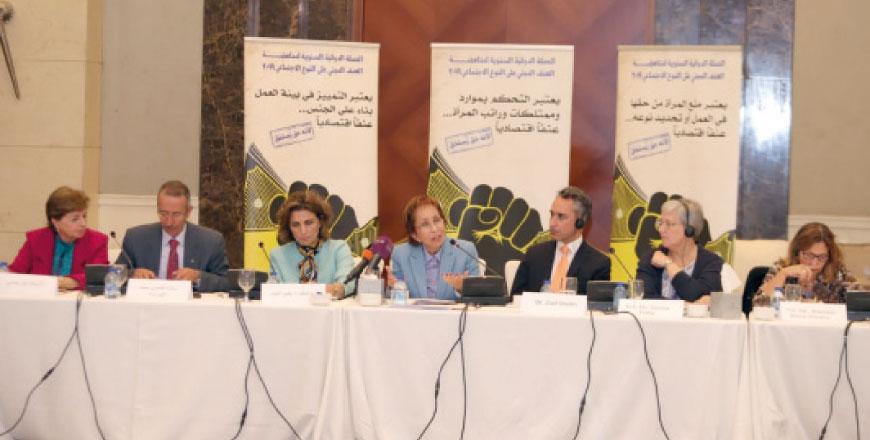You are here
Bridging gender pay gap remains a distant dream
By Joy Mazahreh - May 03,2021 - Last updated at May 03,2021

Image courtesy of SIGI Facaebook page
AMMAN — There are 10,000 Jordanian working women who make less than JD200, out of a total of 250,000 working women in the Kingdom, according to the Solidarity is Global Institute (SIGI).
Rania Al Sarayreh, a journalist specialised in labour and women issues, believes that this number might be an underestimation.
In an interview with The Jordan Times, Sarayreh pointed out that many working women in the Kingdom are not registered in the Social Security Corporation, and many women working in domestic labour are unpaid in the first place, which contribute significantly to the number of underpaid women.
Sarayreh said that the economic pressures resulting from the pandemic have lowered the wages for many women. Moreover, in some cases there is a cultural factor behind women being underpaid, she said.
Some employers, for instance, assume that women are not required to contribute financially to the household and as such are bound to accept lower salaries, she noted.
“The outcome of all of this is a gender pay gap of more than 20 per cent in the private sector only,” according to Sarayreh, who added that many women are unappreciated in the workplace.
Additionally, many working women remain unrecognised since the sectors they work in are not fully regulated.
“Many women in governorates across the Kingdom are either not registered in the Social Security Corporation, work in informal sectors such as the beauty industry, or work at home-based businesses, making them almost invisible,” added Sarayreh.
She explained that the lack of recognition and visibility has many negative consequences on Jordanian women’s financial autonomy in society, or even within the family.
“We can make this reality a better one both legislatively and culturally,” said Sarayreh.
“We have to eliminate discrimination against women and highlight their economic contribution in the workplace,” she noted.
Culturally, Sarayreh emphasised the importance of launching awareness campaigns in collaboration with local organisations and the government, in order to increase appreciation and acknowledgement of women’s economic contributions.
Mervat Salman, a freelance working woman, said: “In my opinion, the gender wage gap in Jordan is nothing but an extension and a reflection of the gender gap in every field.”
A large segment in the industrial and agricultural sectors still believes that women do not contribute as much as men do, and therefore, the wages of workers from both sexes are markedly uneven,” Salman told The Jordan Times.
“Furthermore, many employers also believe that men are more stable at work, while women may be forced to absenteeism due to pregnancy, childbirth and family care,” Salman noted, adding that in many cases women have become the weakest link in the labour market.
“There is no doubt that the poor situation is reflected in the performance of women and their desire to work creatively,” Salman responded to a question on the effect of underpayment on working women in Jordan.
Jordan ranked 138 out of 153 countries in respect to women’s economic participation and opportunities, according to the World Economic Forum’s Global Gender Gap Index of 2020.
“The solutions lie in enforcing laws governing the labour sectors to deter violations to equal wages. Also, awareness of labour rights, laws, and the adverse effects of wage inequality must be spread through publications and campaigns,” Salman said.
Related Articles
AMMAN — HRH Princess Basma on Wednesday called on all concerned parties in the Kingdom to exert more efforts to end economic violence agains
AMMAN — The public sector is forming a network of gender focal points that will work together to mainstream gender and advance women’s right
AMMAN — The lack of decent transportation is one of the main reasons for women’s withdrawal from the labour market, according to a recent st

















